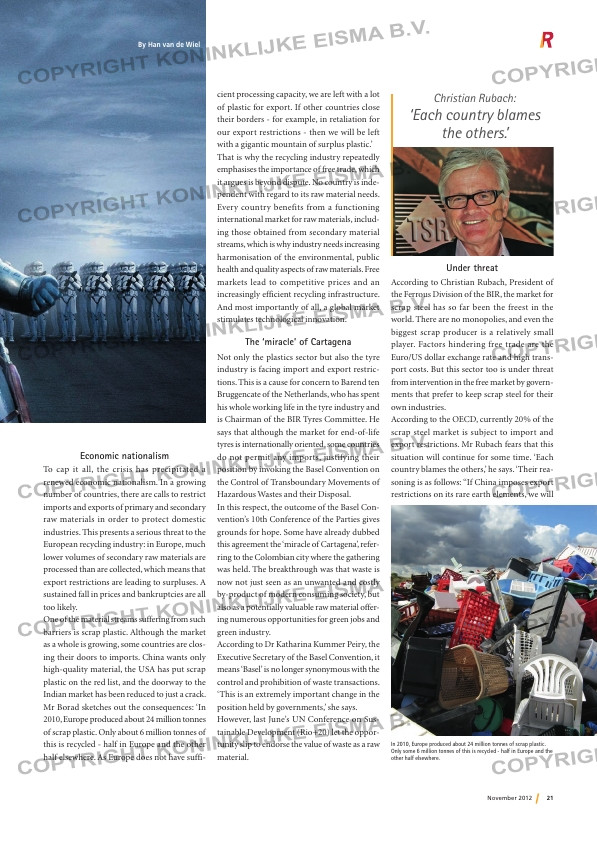Page 21 from: November 2012

21November 2012
Economic nationalism
To cap it all, the crisis has precipitated a
renewed economic nationalism. In a growing
number of countries, there are calls to restrict
imports and exports of primary and secondary
raw materials in order to protect domestic
industries. This presents a serious threat to the
European recycling industry: in Europe, much
lower volumes of secondary raw materials are
processed than are collected, which means that
export restrictions are leading to surpluses. A
sustained fall in prices and bankruptcies are all
too likely.
One of the material streams suffering from such
barriers is scrap plastic. Although the market
as a whole is growing, some countries are clos-
ing their doors to imports. China wants only
high-quality material, the USA has put scrap
plastic on the red list, and the doorway to the
Indian market has been reduced to just a crack.
Mr Borad sketches out the consequences: ‘In
2010, Europe produced about 24 million tonnes
of scrap plastic. Only about 6 million tonnes of
this is recycled – half in Europe and the other
half elsewhere. As Europe does not have suffi-
cient processing capacity, we are left with a lot
of plastic for export. If other countries close
their borders – for example, in retaliation for
our export restrictions – then we will be left
with a gigantic mountain of surplus plastic.’
That is why the recycling industry repeatedly
emphasises the importance of free trade, which
it argues is beyond dispute. No country is inde-
pendent with regard to its raw material needs.
Every country benefits from a functioning
international market for raw materials, includ-
ing those obtained from secondary material
streams, which is why industry needs increasing
harmonisation of the environmental, public
health and quality aspects of raw materials. Free
markets lead to competitive prices and an
increasingly efficient recycling infrastructure.
And most importantly of all, a global market
stimulates technological innovation.
The ‘miracle’ of Cartagena
Not only the plastics sector but also the tyre
industry is facing import and export restric-
tions. This is a cause for concern to Barend ten
Bruggencate of the Netherlands, who has spent
his whole working life in the tyre industry and
is Chairman of the BIR Tyres Committee. He
says that although the market for end-of-life
tyres is internationally oriented, some countries
do not permit any imports, justifying their
position by invoking the Basel Convention on
the Control of Transboundary Movements of
Hazardous Wastes and their Disposal.
In this respect, the outcome of the Basel Con-
vention’s 10th Conference of the Parties gives
grounds for hope. Some have already dubbed
this agreement the ‘miracle of Cartagena’, refer-
ring to the Colombian city where the gathering
was held. The breakthrough was that waste is
now not just seen as an unwanted and costly
by-product of modern consuming society, but
also as a potentially valuable raw material offer-
ing numerous opportunities for green jobs and
green industry.
According to Dr Katharina Kummer Peiry, the
Executive Secretary of the Basel Convention, it
means ‘Basel’ is no longer synonymous with the
control and prohibition of waste transactions.
‘This is an extremely important change in the
position held by governments,’ she says.
However, last June’s UN Conference on Sus-
tainable Development (Rio+20) let the oppor-
tunity slip to endorse the value of waste as a raw
material.
Under threat
According to Christian Rubach, President of
the Ferrous Division of the BIR, the market for
scrap steel has so far been the freest in the
world. There are no monopolies, and even the
biggest scrap producer is a relatively small
player. Factors hindering free trade are the
Euro/US dollar exchange rate and high trans-
port costs. But this sector too is under threat
from intervention in the free market by govern-
ments that prefer to keep scrap steel for their
own industries.
According to the OECD, currently 20% of the
scrap steel market is subject to import and
export restrictions. Mr Rubach fears that this
situation will continue for some time. ‘Each
country blames the others,’ he says. ‘Their rea-
soning is as follows: “If China imposes export
restrictions on its rare earth elements, we will
By Han van de Wiel
Christian Rubach:
‘Each country blames
the others.’
In 2010, Europe produced about 24 million tonnes of scrap plastic.
Only some 6 million tonnes of this is recycled – half in Europe and the
other half elsewhere.
RI_9-FreeTrade.indd 21 09-11-12 16:38



